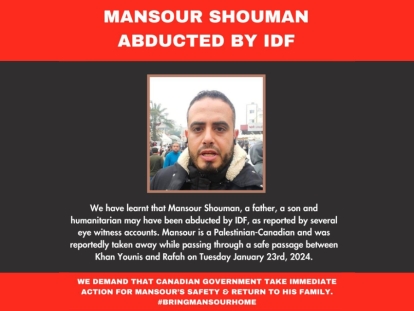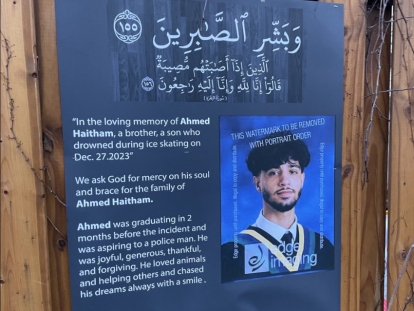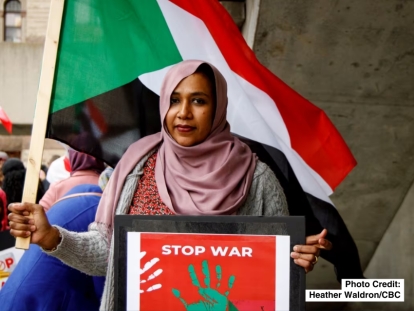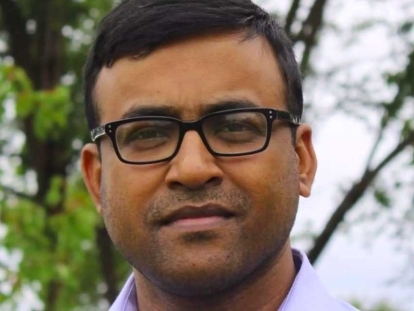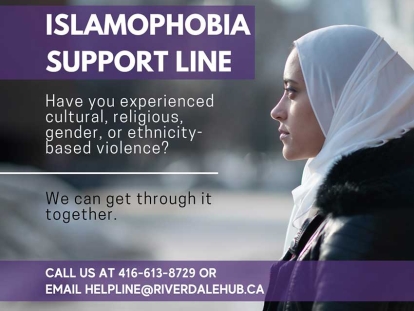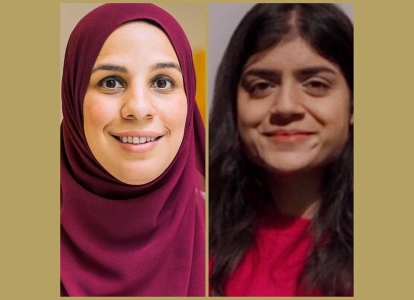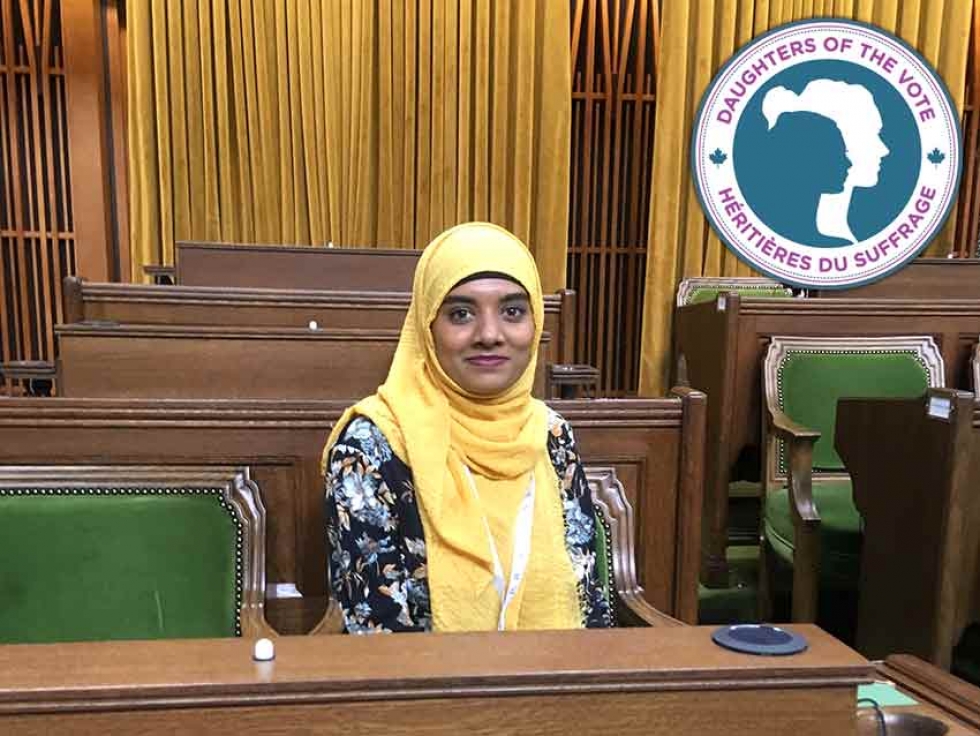 Bangladeshi Canadian Fatima Khan represented the riding of Toronto-Danforth, Ontario at Equal Voice’s second Daughters of the Vote gathering in early April 2019.
Bangladeshi Canadian Fatima Khan represented the riding of Toronto-Danforth, Ontario at Equal Voice’s second Daughters of the Vote gathering in early April 2019.
Apr
Muslimahs on Parliament Hill: Fatima Khan from Toronto-Danforth, Ontario
Written by Making HeadlinesBangladeshi Canadian Fatima Khan represented the riding of Toronto-Danforth, Ontario at Equal Voice’s second Daughters of the Vote gathering in early April 2019, which brought together 338 young women between the ages of 18 and 23, representing each Canadian riding and take their seat in the House of Commons during a historic sitting of the House of Commons. They were addressed by every federal party leader, and engaged with an array of Ministers, critics and advocates.
Daughters of the Vote (DoV) was aimed at encouraging more young women to become involved in Canadian politics, a space where there are still challenges to gender equity.
Muslim Link had the opportunity to interview several of the young Muslim Canadian women who were selected to participate in this historic event, including Fatima.
Tell us about yourself.
I am a Bengali-Canadian born and raised in Toronto. My father first immigrated to Toronto from Bangladesh in the late 80’s, and my mother later in the early 90’s. I am lucky to have visited Bangladesh four times growing up. Through those experiences abroad in the motherland, I have gotten to know and love the family that my parents left behind when they immigrated here. My family in Bangladesh all definitely have contributed an important part in forming my identity as I grew up. Recently, I’ve become very interested in learning more about Bangladesh’s history, and Bangladeshi culture though Bengali music and literature. I am excited to pursue my interest in learning more about my roots as a hobby as I try to navigate myself here in the West.
I am currently studying Politics and Governance at Ryerson University. Through the courses that I have taken, I have learned about the various schools of thought, ideas, institutions, political systems, and issues that formulate politics as we know it today. I am almost a graduate, and the way I see the world definitely has changed since my first day at university five years ago.
My interest in politics stemmed from having to constantly read heartbreaking headlines about deaths of innocent people, and watch the trending news stories of the aftermath of war.
When I decided to study Politics, I was not thinking about what occupation I may be able to pursue with this degree, rather I just wanted to understand what was happening around the world, and why. I think it’s fair to say that I do have a better understanding of the world politics, and it can be very complex and at times saddening to learn how the world of politics works. Being in a degree that encourages me to stay updated on Canadian and world politics, it can also be very mentally exhausting to keep up with the fast, ever-changing world of politics.
Other than studying politics, my involvement with politics includes volunteering with various not-for-profit organizations that advocate for a more just and democratic society. A lot of my work also involves working with and for youth. As someone who has been studying and trying my best to keep up with local and world politics, I believe it is my obligation that I advocate for youth, and keep them informed about issues that concern them and their communities. A lot of discussions around politics are not inclusive to youth, and I believe it is important that youth are heard and included in political discussions. I personally am so amazed by the keen interest that youth I’ve had the privilege to interact with have shown me in regards to issues that affect them and their communities. They are passionate, and hungry for change.
As a young woman involved in politics, what challenges, if any, do you face? Do you feel that the presence of more young women is changing politics? If so, how?
I think some of the challenges that young women face in the realm of politics is that they are deemed incompetent or too radical, depending how one perceives it. Their ideas and visions are not taken seriously, and this mainly has to do with the fact that men are the ones dominating politics, particularly older white men.
Being a young woman involved in politics is hard itself, but to be a young woman involved in politics with different intersecting identities is much more difficult. These intersecting identities include (but are not limited to) your ethnicity, religion, sexuality, race, class etc. Your very existence and presence in such spaces is politicized and attacked. You are questioned and ridiculed on the very aspects of your identity that shape you, and are demanded to prove yourself in ways that your counterparts are not.
It is important to acknowledge who amongst young women are getting invited to sit ar the table to share their ideas, and are being heard. It is vital that Indigenous women, and women from various backgrounds are being welcomed into these spaces not to be tokenized, but to be heard and understood. It is essential that young women from diverse backgrounds and walks of life are intrinsically involved with the political and decision making process. It is only then can the presence of young women in politics indefinitely change the landscape of politics. What concerns young women are the concerns of their communities, and there will be no progress if certain members of our communities are continuously ignored and attacked.
Do you feel that there are also shifts in how young Muslim women are taking up leadership positions within Muslim community organizations in Canada? Do you feel that the presence of young women in these Muslim organizations is changing how these organizations function? If so, how?
Unfortunately, there are many Muslim organizations and spaces that are not inclusive to women. Speaking from my own experiences, Muslims organizations such as mosques, are often run by the Muslim men of the community. The problem with that is often times the mosque’s events and services, its policies, and even the mosque’s spaces are not inclusive of women, nor are they easily accessible by women, if at all.
It goes without saying that young Muslim women are not taken seriously in these spaces when they voice these concerns. Amongst many claims, they are deemed too incompetent or too ‘modern’, and there often also is a generational barrier to mutual understanding. To combat these issues, young Muslim women and girls often have to take the bottom-up grassroots approach and do community organizing to have their concerns and demands heard and met. As an Ummah, we cannot grow and progress if we do not think about our mothers and daughters in our holy spaces.
Through dialogue and community organizing, young Muslim women are making their local mosques a space to grow spiritually and civically, and are making Muslim organizations a safer and more inclusive space for Muslim women and girls. Their dedication and labour towards inclusivity is apparent when we see programming for children, certain topics that concern women being lectured on, female speakers, women’s only services and events, and more accessible spaces in our mosques. I believe that inclusion is an asset for the success of any community serving organization.
By attending Daughters of the Vote, you had an opportunity to meet young women from across Canada. Did any of the realities they shared challenge you to unlearn some assumptions about your fellow Canadians or seek out knowledge about issues you had otherwise not known about your fellow Canadians ? Please elaborate.
As a student of politics, I’ve had to learn and research on a various number of topics related to politics. I’ve learned a bit about issues affecting the Indigenous communities in Canada through attending class lectures and reading scholarly articles for research. But learning and researching about the struggles of the Indigenous communities is very different than having to learn from the personal experiences of young Indigenous women.
I am truly grateful to have been welcomed in the same space as my fellow Indigenous delegates during the DoV week. Being present in such a space, I’ve felt the pain and frustrations that these young Indigenous women and their communities have felt throughout the past generations of their ancestors, and continue to feel in the present day. I feel a reinvigorated sense of anger and frustration towards the injustices that have been systematically imposed in the past and continue to be imposed till this day on the Indigenous communities of Canada. Through my experience of being a DoV delegate, I am more consciously aware of how I navigate myself in this country, and will work to include the experiences and presence of our Indigenous communities in Canada however way I can in my work and through my daily conversations with people.
The biggest reality check I got from this experience is when I realized that I am basically a trespasser on this land, as this land always belonged to the Indigenous people that our government stole from and claimed it as their own. The stark reality of our country’s history is quite dark. Personally, there is so much that I have yet to educate myself on about the struggles of Indigenous communities in Canada, and urge everyone reading this to go do the same. It is the least we can do to show gratitude for our existence and lives in this country to the ancestors of this land who were forced to give up so much.
As it is an election year, what will you be doing to try to get out the vote in your riding?
This federal election, I will be pushing very hard for everyone to go out and vote. It is crucial that people go out and make informed choices this federal election, as many people's lives are at stake.
Over the past few years, we have seen a rise in racism, xenophobia, Islamophobia and anti-Muslim rhetoric from our politicians and fellow Canadians. It is crucial for those of us who are informed of current Canadian politics that we reach out to our communities and encourage everyone to vote, especially those of us who are from marginalized communities and are of people of colour. And if you are not informed, please take the initiative to learn about the political climate in Canada, and what each party stands for and the proposals they have put forward for the future of our country.
I personally plan to go canvassing in my local riding for parties that I know have not proposed or campaigned on divisive rhetoric, and also volunteer with a few organizations that work to educate and encourage citizens to be more politically aware and go out to vote.
I will also volunteer in my local mosque through a couple of Muslim-led organizations that work to get more Muslim constituents to vote by informing them of their rights and current politics. It is important that eligible Muslim voters from all generations go out and vote this federal election, for if our concerns are not heard, then the future of Muslim communities and other minority groups in this country will most likely be compromised for the interests of White nationalists.
What is the key lesson from your experience at DoV that you will be taking back into your work in your riding?
I’d say that the key takeaway I got from this experience is that it is so important to listen to understand, rather then listen to respond.
Throughout the week of Daughters of the Vote, I’ve met and interacted with so many people from different walks of life, that I’ve never had the privilege to interact with before this experience. DoV put all of us in this one big space, and through dialogue and listening, we learned so much from each other.
It has made me realize that I need to make an effort to reach out to people that are often stigmatized and forgotten about, and make sure that the spaces I work in are safe and welcoming to them. This experience has also made me realize that there are more people then I presumed who share dangerous, polar opposite views from me, and that interacting with these people can hurt and be emotionally and mentally exhausting. So it is very important that young women of various intersecting identities have a strong community of support that collectively champion and advocate for each other and their visions. We need to be allies and advocate for other marginalized communities that we may not associate ourselves with, and provide unending solidarity and support. We are stronger and louder when we are unified, and collectively we can continue the momentum of progress that is more inclusive and diverse.
This article was produced exclusively for Muslim Link and should not be copied without prior permission from the site. For permission, please write to info@muslimlink.ca.
